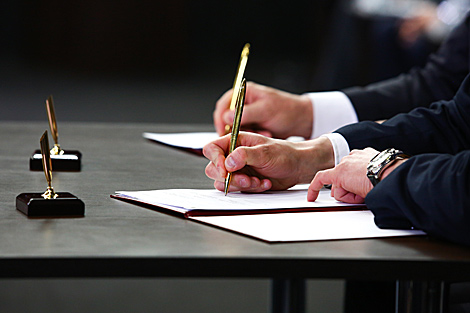Events
UNICEF, Special Olympics Belarus sign memorandum of cooperation

An archive photo
MINSK, 6 April (BelTA) - The United Nations Children's Fund (UNICEF) in Belarus and Special Olympics Belarus signed a memorandum of cooperation on 6 April. The signing ceremony took place online as part of an open lecture on building friendly and comfortable communication with special needs children, BelTA has learned.
Special Olympics Belarus is working hard to develop inclusive approach in our country through inclusion of people with disabilities in sports and healthy lifestyle. Among other things, it organizes sports events (regional and national competitions in football, basketball, table tennis, swimming, athletics, etc.), informational and other events in which people with special needs take part. With the support of state institutions, it organizes sports training sessions and qualifying competitions to prepare the Belarusian national team for participation in the European and international special Olympics. It also works to implement special Olympic programs Healthy Athletes, Young Athletes, Athlete Leadership, the parental program, and the involvement of volunteers.
“The International Day of Sport for Development and Peace, which we celebrate today, is an opportunity to demonstrate commitment to peace initiatives and the importance of inclusion, the role of sport and physical activity in the lives of people around the world. Sport is a universal way of communication between people, it unites people regardless of their nationality, beliefs, physical and intellectual abilities and opportunities. Different competitions, training sessions, workshops and friendly meetings help reduce anxiety, improve physical and mental health of children and people with intellectual disabilities, strengthen their resilience and help them overcome difficulties in life. It fosters socially relevant qualities. Most importantly, Special Olympics helps push past boundaries, breaks stereotypes and gives hope to those with disabilities feel like normal people,” said Larisa Tabolina, Executive Director of Special Olympics Belarus.
UNICEF also fights a lot against stigmatization of society and works to create conditions when equal rights for all children are secured in different spheres of life, including in sports. UNICEF Representative in Belarus Tanja Radocaj emphasized that in addition to the needs common to all children, special needs children require experts to help them overcome physical and psychological difficulties and barriers and develop their abilities. Special Olympics Belarus offers that kind of help, since ordinary teachers at schools might not always have enough knowledge and energy to invest in the individual development of children with special needs.
The signing of the memorandum became a logical continuation of the already established cooperation between UNICEF and the Belarusian committee.
The pandemic has changed the format of activities, but they continue. Plans are in place to organize educational events and even set up joint structures. The first step in the implementation of the memorandum will probably be joint sport events as part of the national football tournament in May.
Vast experience in the organization of different special helped the specialists of Special Olympics to formulate some advice on communication with special needs people. Larisa Tabolina and Director of Development Olga Tomukevich voiced the recommendations at the open lecture.
Sincere attitude is based on friendship, mutual understanding, equality and respect. Try not to focus on the peculiarities of a person who has a mental disability. These people, like any other, are perfectly capable of recognizing an arrogant or prejudiced attitude. It is important to look the person in the eyes and make sure your faces are at the same level. Express your interest and goodwill.
If you do not directly communicate with such a person, then do not stare at him/her.
Relate this person's life experience to the topic of the conversation. It can be difficult for a person with a mental impairment to grasp the essence of a conversation if it is not supported by some examples, visual demonstration. These should be simple, clear sentences with a clear meaning. Questions should be like that, too. Be attentive to responses. Do not be shy to ask whether the interlocutor understood you. At the same time, you should not talk to an adult with mental disabilities as you would to a five-year-old. This can accidentally offend. He or she may understand you perfectly well, but it is not always under such a person’s power to answer as clearly and competently. Be ready for straightforwardness and uncomfortable remarks of such interlocutors - they simply do not know how to lie, they say what they think.
Try to speak slowly, articulating each word clearly. A loud voice does not make it easier to understand - you do not need to raise it, keep a calm tone.
Be prepared for emotional expressions of such people. When they are happy, they show it openly - they try to hug, kiss, touch. If it is unacceptable for you, try to gently hold such a child by the shoulders and switch his/her attention to the surrounding objects, to a conversation. If it is an adult - gently and calmly explain that you do not like it. When your child, for example, on the playground is approached in this way by a child with disabilities - do not react harshly. In order not to develop aggression or indifference in your child, talk to him, explain that all people are different, and this kid just does not know how to play and communicate.
Wait for approval when offering to help a person with special needs. Do not be shy to ask how you could help in any particular situation. If you are not understood, explain again that you are willing to help, but do not try to be proactive: seemingly harmless actions can be frightening or upsetting. Do not give out advice to parents of special needs children.
Special Olympics Belarus is the world's largest year-round sports training and competition program for children and adults with disabilities. Special Olympics Belarus was registered in 1992.







 print version
print version make home page
make home page add to bookmarks
add to bookmarks

